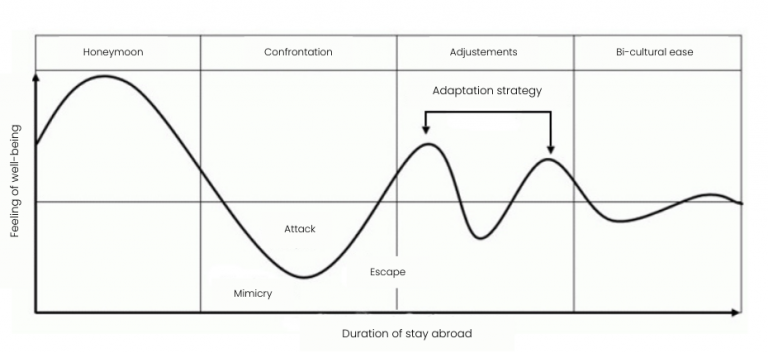Traveling and Coming Back: Coping With Shocks
Autor : Charli Nicolas
Reading time : 5 minutes
When traveling to distant countries, and particularly when choosing to travel off the beaten track, it can happen that the cultural difference between oneself, one’s surroundings and the people one meets, or the new environment one discovers, is such that it can create an emotional or even physical shock. According to the French language dictionary, “culture shock refers to the confusion and personal maladjustment caused by the experience of a culture that is foreign and different from one’s own culture or its anticipation.”
This notion can encompass several aspects, such as language (this is particularly true in countries where the alphabet is different from our own, as in Japan, for example), gastronomy or even customs and values that create a gulf between two seemingly very different environments.
It’s not uncommon to feel uncomfortable when traveling for the first time in a country where cultural references are far removed from one’s own, and sometimes even discordant. Everyone has their own capacity to adapt.

You can recognize the signs of culture shock when you travel. Everyone reacts differently to change, but certain symptoms are recognizable. These include fatigue, irritability and a lack of enthusiasm in the face of novelty and the discovery of a new culture.
According to sociologists who have studied the phenomenon of culture shock, there are three main phases of reaction to a foreign culture. The first phase is called the honeymoon, which is in fact the discovery phase: you’re amazed by the world you’re discovering, you want to taste and see everything, meet new people, etc. The second phase is called the “detachment” phase, which is in fact the discovery phase.
The second phase is called “distress”: shock begins to set in, and we begin to experience symptoms of frustration and even anger at the world around us.
Finally comes the adaptation phase: we’ve absorbed the information about the new world in which we’re evolving, and we’ve developed a certain routine, habits that enable us to feel good and live “like the locals”. So you’re able to adapt to this new culture.
Of course, this is a theoretical sociological analysis, as each person experiences culture shock in different ways and according to different processes.

There’s no real cure for culture shock, as it’s a psychological process that’s difficult to anticipate. Nevertheless, before setting off on a trip, it’s a good idea to find out about the phenomenon and prepare yourself for any upheaval. Finding out about the history of the country you’re going to, its customs, habits, cultural differences, sensitive subjects and culinary specialities can already give you an idea of how to behave in certain situations. It also lets you know what to expect.
However, you shouldn’t fear this shock; rather, try to anticipate it as much as possible to limit its negative impact, as it will teach you a great deal about the host country and about yourself.
What’s more, the beauty of travel and discovery also lies in the unknown; the important thing is to adopt an attitude of openness, tolerance and curiosity, always with respect.
At Village Monde, we offer the option of exploring solidarity lands. These explorations offer the opportunity to discover tourist experiences off the beaten track, notably by meeting remote communities. This type of travel involves total immersion in a culture and with a community.
Interestingly, children are often less prone to culture shock, as they are more adaptable, unprejudiced and open to discovery. We invite you to read the article written by Elodie Pellequer, a testimonial to an exploration of solidarity lands with her family. You’ll see that children generally adapt much more easily than we do!
Tourism off the beaten track is the ideal way to discover a country in an authentic way, as close as possible to the communities. So don’t hesitate to take the plunge. With Village Monde, you can be supported in this approach while participating in the NGO’s objective: to promote the well-being of local communities and identify responsible tourism projects in the most remote regions.
We often hear about culture shock, but not often enough about return shock, which also varies greatly from one person to another. And it’s wrong to think that you have to leave for a long time to experience such a destabilizing situation on your return.
Return shock” describes the feeling of dislocation or confusion one may experience on returning to one’s home country after a prolonged stay abroad. Contrary to expectations, return does not always mean a simple “return to normal”. Life back home has evolved without us, and we often return transformed by new habits, values and perspectives.
This contrast can create a feeling of strangeness, even nostalgia, as if we’ve become “strangers at home”.
To soften the blow, it’s best to approach this transition with patience. Allowing yourself time to readjust is essential, without putting pressure on yourself to go back to “the way things were”. Gradually reconnecting with the routines and landmarks of your original environment helps to recreate a sense of stability. What’s more, sharing experiences and anecdotes with loved ones, or even writing them down in a diary or blog, helps to externalize and give a place to this enriching period, while helping those around you to better understand the changes experienced. It’s also a good idea to keep in touch with the people you met during your stay, so you don’t fall off the wagon when you get back.
Finally, getting in touch with groups or communities of former expatriates can offer invaluable support: these people are familiar with the challenges of returning home, and can offer a sympathetic ear and advice to help you get through this period of readjustment.
In short, whether you’re away for three weeks, three months or three years, you may experience a certain amount of shock, both on the spot and on your return, which should be seen as a normal part of the learning process, given the highly enriching and transformative nature of this type of experience. Knowing about these phenomena beforehand, and recognizing them when we experience them, helps to put them into perspective. It can also be beneficial to share our feelings with trusted people or mental health professionals.
———————
Photo credit: Culture shock and adaptation – ULaval
Subscribe to the travel newsletter from our collaborative booking platform Vaolo to find out what’s new, follow our explorers and receive tips for more conscious travel.
The use of the masculine gender has been adopted for ease of reading and has no discriminatory intent.
© 2025 All rights reserved. Village Monde.
By continuing to use the site, you agree to our privacy and cookie policy
I accept